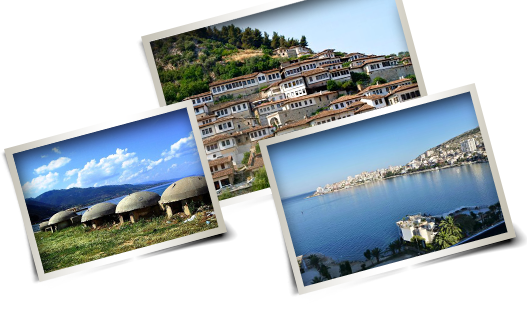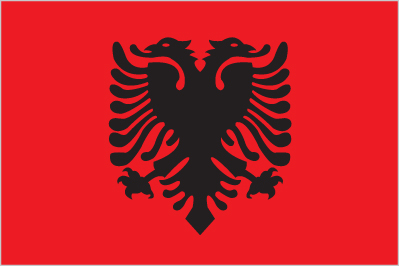''...tour guides Rozle and Klemen worked tirelessly and took care of us like family...''
Destinations

Albania
- GENERAL INFORMATION
Location: Southeastern Europe, bordering the Adriatic Sea and Ionian Sea, between Greece in the south and Montenegro and Kosovo to the north
Border Countries: Greece 282 km, Macedonia 151 km, Montenegro 172 km, Kosovo 112 km
Area: 28,748 sq km (slightly smaller than Maryland)
Population: 3,002,859
Capital City: Tirana (Tirane) (population 421,000)
Religions: Muslim 70%, Albanian Orthodox 20%, Roman Catholic 10%
Government type: parliamentary democracy
Coastline: 362 km
Highest point: Maja e Korabit (Golem Korab) 2,764 m
Roadways: 18,000 km
Time difference: UTC+1 (6 hours ahead of Washington, DC during Standard Time)
National currency: Lek
International dialing number: +355
Electricity: 220V, 50Hz
Visa: For visitors from most countries (EU, USA, etc) a visa is not needed. Only a valid passport is required
- CLIMATE
Mild temperate; cool, cloudy, wet winters; hot, clear, dry summers; interior is cooler and wetter
- TERRAIN
Mostly mountains and hills; small plains along coast
- LANGUAGES
Albanian (official - derived from Tosk dialect), Greek, Vlach, Romani, Slavic dialects
- ETHNIC GROUPS
Albanian 95%, Greek 3%, other 2% (Vlach, Roma (Gypsy), Serb, Macedonian, Bulgarian)
- HISTORICAL BACKGROUND
Albania declared its independence from the Ottoman Empire in 1912, but was conquered by Italy in 1939. Communist partisans took over the country in 1944. Albania allied itself first with the USSR (until 1960), and then with China (to 1978). In the early 1990s, Albania ended 46 years of xenophobic Communist rule and established a multiparty democracy. The transition has proven challenging as successive governments have tried to deal with high unemployment, widespread corruption, a dilapidated physical infrastructure, powerful organized crime networks, and combative political opponents. Albania has made progress in its democratic development since first holding multiparty elections in 1991, but deficiencies remain. International observers judged elections to be largely free and fair since the restoration of political stability following the collapse of pyramid schemes in 1997; however, there have been claims of electoral fraud in every one of Albania's post-Communist elections. The 2009 general elections resulted in a coalition government, the first such in the country's history. Albania joined NATO in April 2009 and is a potential candidate for EU accession. Although Albania's economy continues to grow, the country is still one of the poorest in Europe, hampered by a large informal economy and an inadequate energy and transportation infrastructure.
- ECONOMY OVERVIEW
Albania, a formerly closed, centrally-planned state, is making the difficult transition to a more modern open-market economy. Macroeconomic growth averaged around 6% between 2004-08, but declined to about 3% in 2009-11, and 0.5% in 2012. Inflation is low and stable. The government has taken measures to curb violent crime, and recently adopted a fiscal reform package aimed at reducing the large gray economy and attracting foreign investment. Remittances, a significant catalyst for economic growth declined from 12-15% of GDP before the 2008 financial crisis to 8% of GDP in 2010, mostly from Albanians residing in Greece and Italy. The agricultural sector, which accounts for almost half of employment but only about one-fifth of GDP, is limited primarily to small family operations and subsistence farming because of lack of modern equipment, unclear property rights, and the prevalence of small, inefficient plots of land. Energy shortages because of a reliance on hydropower - 98% of the electrical power produced in Albania - and antiquated and inadequate infrastructure contribute to Albania's poor business environment and lack of success in attracting new foreign investment needed to expand the country's export base. FDI is among the lowest in the region, but the government has embarked on an ambitious program to improve the business climate through fiscal and legislative reforms. The completion of a new thermal power plant near Vlore has helped diversify generation capacity, and plans to upgrade transmission lines between Albania and Montenegro and Kosovo would help relieve the energy shortages. Also, with help from EU funds, the government is taking steps to improve the poor national road and rail network, a long-standing barrier to sustained economic growth. The country will continue to face challenges from increasing public debt, having slightly exceeded its former statutory limit of 60% of GDP in 2012. Strong trade, remittance, and banking sector ties with Greece and Italy make Albania vulnerable to spillover effects of the global financial crisis.
- FLAG DESCRIPTION
Red with a black two-headed eagle in the center; the design is claimed to be that of 15th-century hero George Castriota SKANDERBEG, who led a successful uprising against the Turks that resulted in a short-lived independence for some Albanian regions (1443-78); an unsubstantiated explanation for the eagle symbol is the tradition that Albanians see themselves as descendants of the eagle; they refer to themselves as "Shkypetars," which translates as "sons of the eagle".


